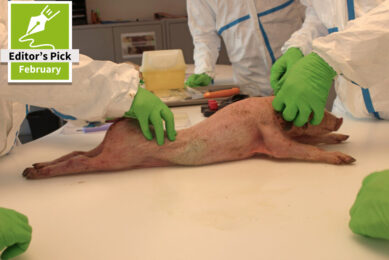Microencapsulation protects novel additives for gut health

Microencapsulation offers a promising solution for the targeted delivery of novel additives to the animal gut, ensuring that these substances are released in specific areas of the digestive tract to maximise their impact.
WORLD OF MICROBES SPECIAL 2024 – read all articles
There are various ways to modify gut microbiota using coated, slow-release, or pH-sensitive additives. These additives – ranging from compounds and microbial species to stimulants and inhibitors – can be targeted to specific points in the digestive tract to alter microbiota and address metabolic issues common in ruminant and monogastric animals. Such issues impact milk production, growth rates, and feed efficiency. By modulating gut microbiota with zoo-technical feed additives, livestock, poultry, and fish farming can boost productivity while supporting animal health and welfare.
Ruminants
The rumen’s unique environment supports millions of microflora that ferment the ruminant’s diet, producing essential byproducts. However, ruminants capture less energy from feed than non-ruminants, as energy is lost as heat and methane during fermentation. Forage-based diets produce acetate, while concentrate diets yield more energy-efficient propionate. Yet, high-concentrate diets can cause acidosis. To prevent this, propionate-producing microorganisms like Megasphera elsdenii are used, but they struggle with survival. Maxx Performance’s microencapsulation technology stabilises and releases Megasphera elsdenii in the rumen, improving energy efficiency and preventing acidosis.
Copper management is another challenge in ruminants. While sensitive to copper toxicity, ruminants often face copper deficiency due to interactions in the gut. Molybdenum and sulphur in plants combine to form thiomolybdate, which binds to copper, hindering absorption. Microencapsulation technology now coats copper to avoid these interactions, enhancing copper absorption in ruminants.
Monogastrics
With the reduced use of medicated feeds, the livestock industry has turned to alternative feed additives to support gut health and improve performance. While antibiotics reduce microbial loads and immunological stress, freeing nutrients for growth, alternative compounds – such as organic acids, minerals, botanicals, and essential oils – work differently. They don’t lower microbial loads but modify gut microbiota by limiting harmful bacteria and promoting beneficial species. This improves gut pH, protects gut mucins, enhances nutrient absorption, and boosts immunity, benefiting poultry, livestock, and humans.
Poultry and swine
Clostridia and pathogenic coliform bacteria struggle to thrive in low-pH environments, making pH regulation essential for disease resistance. Maxx Performance has developed slow-release microencapsulated blends of organic acids, essential oils, and minerals that ensure these additives reach the duodenum and beyond, improving gut health in poultry and swine while reducing reliance on antibiotics.
Copper’s antimicrobial properties are protected through microencapsulation, allowing it to be released in the lower gut without binding to other compounds. This reduces harmful bacteria, enhances nutrient absorption, and promotes animal growth. Maxx Performance’s slow-release copper has been successfully incorporated into poultry diets over a period from 1-14 and 15-28 days. This led to healthier birds, reduced diarrhoea, faster growth, and better feed efficiency. In addition to copper, microencapsulation can be used to deliver other ingredients to improve pH regulation in feed, and prevent undesirable microorganisms from colonising the gut. Zinc oxide, a bacteriostatic agent used in swine to control Salmonella, is now delivered via slow-release microencapsulation to target the distal gut, improving health and growth. This technology can be applied to individual ingredients or blends of minerals and therapeutic compounds. For instance, microencapsulated green tea extract, though more costly, remains highly effective in broiler diets even at lower doses.
Turkey poults
In a farm trial, turkey poults fed a diet with slow-release essential oils saw a mortality rate of 6.5%, compared to 9.4% in the control group, a 67% reduction.
Piglets
Organic acid blends have also reduced enteric diseases in weaning piglets by lowering stomach pH, improving digestion, and reducing diarrhoea risk. A Brazilian study (Callegari, 2014) found that Maxx Performance’s slow-release organic acids increased villi height (Table 1), enhanced volatile fatty acid production, improved absorption, and significantly reduced piglet diarrhoea (Table 2).
Future prospects
The livestock industry is increasingly interested in microencapsulated probiotics, which are more resistant to heat and bile acids. Maxx Performance’s research showed that microencapsulation significantly improves probiotic stability, reducing log loss during processing compared to uncoated probiotics. The 60% encapsulated probiotics exhibited the highest stability, further underscoring microencapsulation’s benefits.
Ultimately, microencapsulation technology not only optimises the delivery of feed additives but also paves the way for raising poultry, swine, ruminants, and other livestock in a healthier, more sustainable way.







